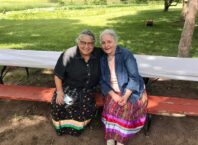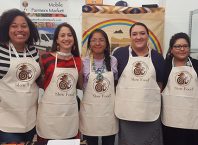Louise and Heid Erdrich, acclaimed writers and sisters, besides being busy nabbing Minnesota Book Awards, have embarked on a new venture to create a foundation that publishes Ojibwe, Dakota, and other Native language books and promotes Native language learning.
The Foundation, Birchbark House, operates under the direction of the two sisters and is associated with Birchbark Books, a Native American focused, independent bookstore owned by Louise in Minneapolis’s Kenwood neighborhood.
The foundation is a “continuation of the work we have already started,” said Heid. The bookstore’s publishing house, Wigwassi Press, already has two books currently in distribution: one by Jim Clark, which contains stories in English and Ojibwe, and the other by Anton Treuer, which is written entirely in the Ojibwe language. Wigwassi also has other titles that are in various stages of development. Birchbark House will take over Wigwassi Press and continue to publish more Native language titles under the new banner.
Heid said that while there are numerous Native writers composing books in their own language, they often self-publish these works, which can be cost prohibitive. Heid said that Birchbark House hopes to help relieve the author from the responsibility of publishing, so that Native writers can focus on writing rather than fronting the cost of publishing a book.
Wigwassi Press had agreements with several Native writers who have self-published Native language books before the foundation formed. Now that Wigwassi is part of the nonprofit Birchbark House, more resources will go toward professionally publishing these works and acquiring new Native language texts. Eventually the foundation would also like to add editorial staff to support and nurture Native writers.
Birchbark House is still in the beginning stages of raising startup funds and obtaining nonprofit status. The organization is classified as a nonprofit in Minnesota, but continues to work toward a federal classification. The foundation is seeking individual donations and approaching other charitable organizations for grants.
Heid said she hopes that Birchbark can also partner with tribes that are interested in the kind of resources that Birchbark House can provide. “There is a real need,” she said, “and it would cost these tribes less to have us publish these works than for them to do it themselves.”
Heid said that she and Louise believe it is important to them to learn the language of their elders. Louise echoed these thoughts in a letter of intent concerning the organization’s founding: “One of my most powerful childhood memories is listening to my grandfather, Patrick Gourneau, pray in the language of our ancestors. Knowing that he cared enough to keep Anishinabemowin alive and to pray for my particular well-being helped me through many difficult times in my life. I have heard others say the same about their own elders, and that is why many years later I set out to learn Anishinabemowin.”
Both sisters studied at the University of Minnesota with Jim Clark, a respected elder who teaches Ojibwe and whose book Wigwassi Press has since published. “I’m certainly not an expert,” Heid said, but she says studying the language is a life long journey. Heid said that eventually Birchbark House would like to publish two Native language books a year, including works written by elders in the community, as well as new voices, in order to keep Ojibwe and Native languages alive.
They’d also like to re-publish historical pieces and publish audio books in Ojibwe and Dakota. One thing the foundation won’t do, though, is publish new English literary work. “We’re not a literary press,” Heid said. “We will only publish bilingually, and we’ll only work with Native writers working in their own language.”
The other aspect of the Erdrich sisters’ vision for Birchbark House includes producing educational material and providing resources for students of Ojibwe. According to the Birchbark House website, the nonprofit would eventually like to produce school curriculum texts and support immersion programs and writing workshops that encourage the use of Native American languages.
Heid has been doing the bulk of directing and organizing the legal aspects and inquiries, but she hopes to eventually get to a point where the organization can hire a full-time director and staff. Until then Heid, Louise, the members of the board and other supporters have been volunteering their time to develop the organization.
Somehow, though, Heid says she finds a balance. “I always have to write,” she said, “and so does Louise.” But Heid said that it’s important for her to be involved in her community. “It can be a lot at times,”she said, “But I hope to be involved with the organization in some way for the rest of my life.”
For more information see the website at: http://birchbarkbooks.com/Foundation.






